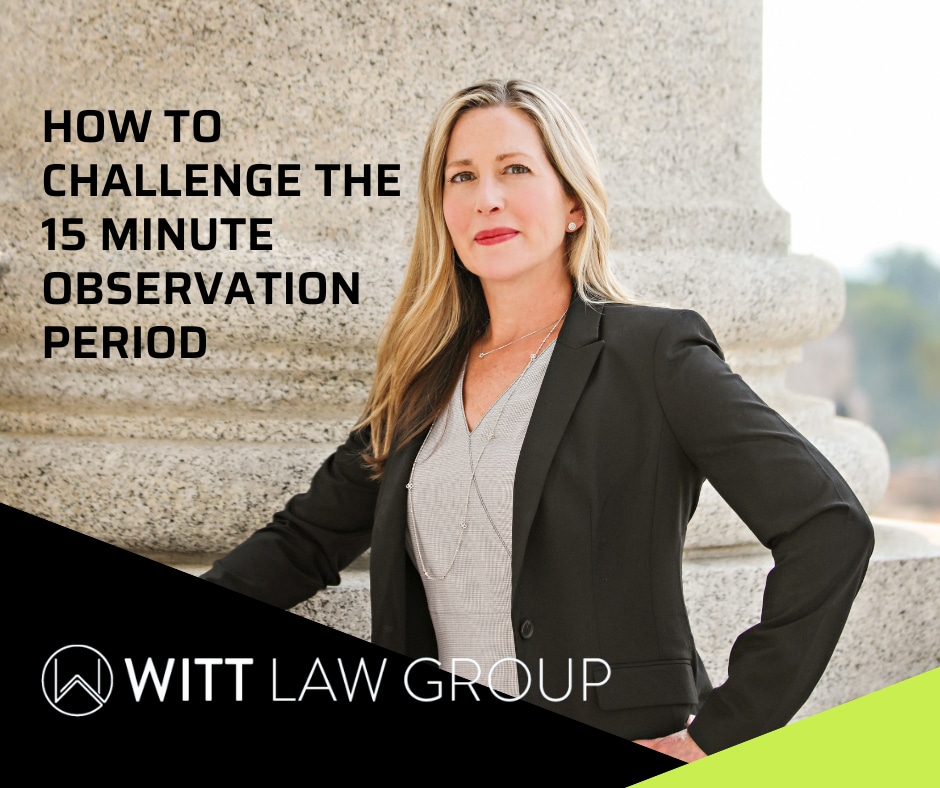
When a DUI defense attorney looks over the facts of a case, one of the first stages of analysis is reviewing the investigation for evidence that can be suppressed. In other words, the suppressed evidence would be declared inadmissible at a future trial.
One of the most common pieces of evidence that a skilled DUI attorney will attempt to suppress is the results from the BAC (Blood Alcohol Content) test. If the BAC result is suppressed, this removes the most significant piece of evidence from the State in a DUI prosecution.
Without the BAC test result, the State must prove the defendant was impaired under on the “affected by” prong of the DUI statute. While many DUI defendants are convicted under this prong, trials that proceed under those facts are certainly more challenging for a prosecutor. So, how do you suppress the BAC result?
Challenge the 15 Minute Observation Period
Under Washington’s law governing breath tests, an officer must conduct a fifteen minute observation of a person arrested for DUI prior to the administration of the breath test. This requirement comes from RCW 46.61.506, Washington Administrative Code (or WAC) 448-16-040 and from the Washington State Patrol’s BAC DataMaster Operator’s Manual. Each of these authorities mandate an uninterrupted observation period of at least 15 minutes.
If the observation period is interrupted, it must be restarted – including a new mouth check.
The observation period begins with the officer conducting a mouth check. This can either be a physical inspection or the officer can simply ask the subject if they have anything in their mouth. Once the mouth check is complete, the observation period has begun. The following is a statement that must be sworn to, every time an officer conducts a BAC test:
This begs the question, what does “observe” mean? It’s meaning should be very clear. However, based on reading hundreds of police reports, this is not always the case. Many officers treat this requirement very loosely despite the fact they are signing under oath that they have conducted the observation period accurately.
Most defense attorneys argue that any break in the observation period invalidates the period, and thus, invalidates the test result. For example, when the officer fills out forms, she should not leave the room for any reason. And, most certainly, the officer should not begin an observation period in which the suspect is in the back of a patrol car and driven around.
Most defense attorneys have a very black and white definition of the meaning of “observe”–the officer must actually watch the suspect and make sure the person did not vomit or place anything in her mouth. For defense, a consistent or uninterrupted watch period is the definition of observe. Unfortunately, the courts see things a bit differently.
“Observe” Doesn’t Necessarily Mean Visual Observation
In 2013, a Washington Appellate Court chipped away at the requirement for direct, 100% visual observation. The Court in State v. Mashek , 177 Wn.App 749, ruled that the observation “need not be strictly visual but, rather, can be a combination of other senses….” The Court lowered the bar and said as long as there is “prima facie evidence” (evidence of sufficient circumstances that would support a logical and reasonable inference of the facts sought to be proved) that the person did not vomit, eat, drink, smoke, or have foreign substances in their mouth for 15 minutes before the test, then the test is valid.
The Mashek Decision Is An Obstacle, But Not Insurmountable
While the Mashek decision created quite a bit of “gray area” in the observation period requirement, the ruling did not deny the importance of the procedure. For that reason, an experienced DUI defense attorney should always consider reviewing the officer’s actions during this period.
Frequently, we find reports that establish the officer or multiple officers did not follow proper protocol during the arrest and investigation. For example, the observing officer will leave the BAC room for several minutes and a second officer, who did not observe the subject, signs the form. Furthermore, the officer can not claim there was a clean observation period of a defendant in the back of a patrol cruiser.
The ability to suppress the BAC result with this “observation period” defense can be challenging but always worth the analysis. When the defense prevails, it can be highly productive in the criminal case as well as the DOL hearing.
Contact A DUI Defense Attorney
The penalties for a DUI conviction are severe. If you are facing a DUI charge, give yourself the best chance at avoiding or mitigating the penalties of a DUI conviction. Contact the DUI defense attorneys at Witt Law Group right away!
We understand that serious legal matters cannot always be addressed between 9 to 5 so don’t worry about calling after hours. We take cases in Kitsap and Thurston Counties as well as cities in those areas such as Bremerton, Poulsbo, Port Orchard, Silverdale, Lacey, Tumwater, and Olympia.
Call to see if we can help you. We offer complimentary strategy sessions for those with cases in areas we serve. 360-792-1000

Get help now
Whether you choose to handle your case alone or engage the Witt Law Group, being informed and prepared is essential. Early involvement of an attorney can significantly impact your chances of a fair recovery, allowing you to focus on healing while we handle negotiations with insurance adjusters to secure fair compensation for your injuries.




